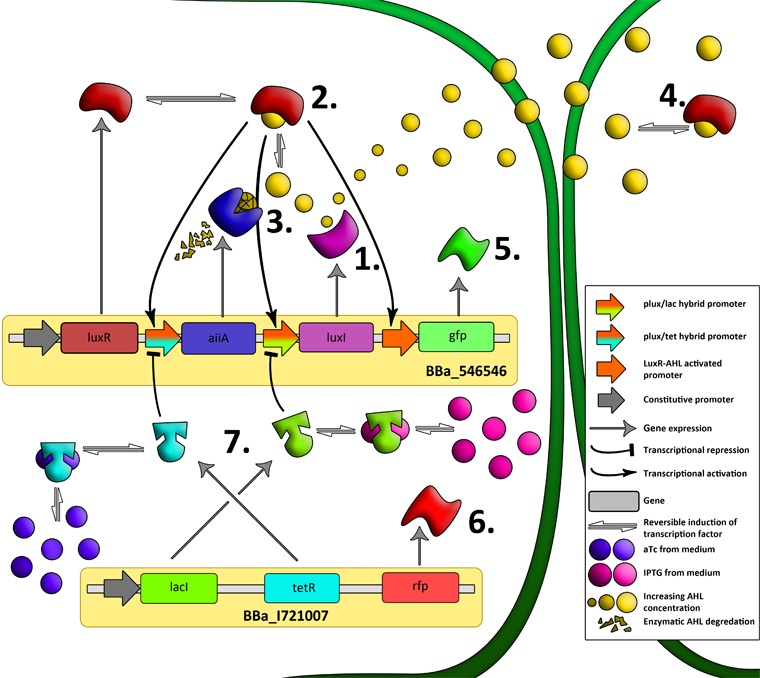The Synchroscillator: A tunable oscillator
 1: The AHL Synthase LuxI is expressed at a basal level when AHL concentration is low. Relative AHL concentration increases as a function of cell density.
1: The AHL Synthase LuxI is expressed at a basal level when AHL concentration is low. Relative AHL concentration increases as a function of cell density.
2: As the concentration of AHL increases, it associates with the constitutively expressed transcription factor LuxR, thereby up-regulating the expression of AiiA, LuxI and GFP. As LuxI accumulates, the concentration of AHL increases rapidly as a result of the LuxR-AHL -> LuxI positive feedback loop.
3: The AHL-degrading enzyme AiiA does not accumulate as rapidly as LuxI. However, the degradation of AHL occurs at a faster rate than AHL synthesis, effectively reducing the level of active LuxR (and its transcriptional activity). This delayed negative feedback results in oscillations in AHL concentration.
4: AHL diffuses freely between cells, synchronizing LuxR-AHL dependent transcriptional activity across a population of cells.
5: LuxR-AHL dependent GFP expression allows the fluctuations in AHL concentration to be observed in situ. LuxI, AiiA and GFP all have LVA tags and are degraded rapidly (albeit at slightly different rates).
6: Constitutively expressed RFP allows the distinction between the effects of cell growth and of the true oscillations of GFP expression due to our system.
7: The repressors LacI and TetR are constitutively expressed. They inhibit the expression of luxI and aiiA respectively. Adding IPTG removes the LacI repressor and aTc removes the TetR repressor.
Data for our favorite new BioBrick parts
[http://partsregistry.org/Part:BBa_K546546 BBa_K546546] - The Synchroscillator: Our goal was to achieve synchronized oscillatory behavior in a population of E. coli cells. Our data shows that this has been achieved. Moreover, we have designed the system in such a way that its expression dynamics are tuneable when operated in conjunction with a tuner device.
[http://partsregistry.org/Part:BBa_K546005 BBa_K546005] - AHL-induced AHL synthase generator with fluorescent reporter: Our data shows an increase in GFP expression per cell over time, providing evidence that the GFP expression is under regulation of a positive feedback loop. This is in accordance with our expectations.
[http://partsregistry.org/Part:BBa_K546001 BBa_K546001] - AHL-induced AHL hydrolase generator: From our data we can conclude that AHL-induced GFP expression significantly drops after treatment with AiiA in contrast to no treatment with AiiA. This is in accordance with our expectations.
Data for pre-existing BioBrick parts
[http://partsregistry.org/Part:BBa_I0460:Experience BBa_I0460] - aiiA Device: Autoinducer inactivation enzyme A (AiiA) is capable of degrading the quorum sensing molecule AHL.
[http://partsregistry.org/Part:BBa_K082014:Experience BBa_K082014] - Autoinducer synthethase: Produces the quorum sensing molecule 3-oxohexanoyl-homoserine lactone (AHL).
[http://partsregistry.org/Part:BBa_I763020:Experience BBa_I763020] - GFP + LVA Tag This GFP with an LVA-tag functioned as expected: our data clearly shows that the GFP is rapidly being degraded.
[http://partsregistry.org/Part:BBa_F2621:Experience BBa_F2621] - F2621 Our sequencing data showed that this part was incomplete and therefore we repaired it and also experimentally proved that our repaired part had the functionality the received part was lacking.
[http://partsregistry.org/Part:BBa_J24675:Experience BBa_J24675] - J24675 We placed a promoter in front of this part and then sent the hereby created part for sequencing. The sequence data did not correspond to the sequence obtained from the Registry of Standard Biological Parts.
Other new BioBrick parts
[http://partsregistry.org/Part:BBa_K546002 BBa_K546002] - AHL-induced GFP reporter Our data shows that upon addition of AHL the expression of GFP is increased. This BioBrick part thus works as expected.
[http://partsregistry.org/Part:BBa_K546000 BBa_K546000] - AHL-induced Ahl synthase generator: Our data shows an increase in GFP expression per cell over time, providing evidence that the GFP expression is under regulation of a positive feedback loop. This is in accordance with our expectations. This BioBrick part does not actually contain GFP(BBa_K546002), but it can be deduced to work the same as BBa_546005.
[http://partsregistry.org/Part:BBa_K546003 BBa_K546003] - Fixed F2621 Our data shows that by adding the R0063 promoter to the broken F2621 we restored the BioBrick part to proper functionality. The reason for malfunctioning is that if LuxR isn't present because of the absence of the promoter, no LuxR-AHL complex can be formed and therefore the downstream pathway doesn't react to an increasing AHL concentration anymore.
 "
"



